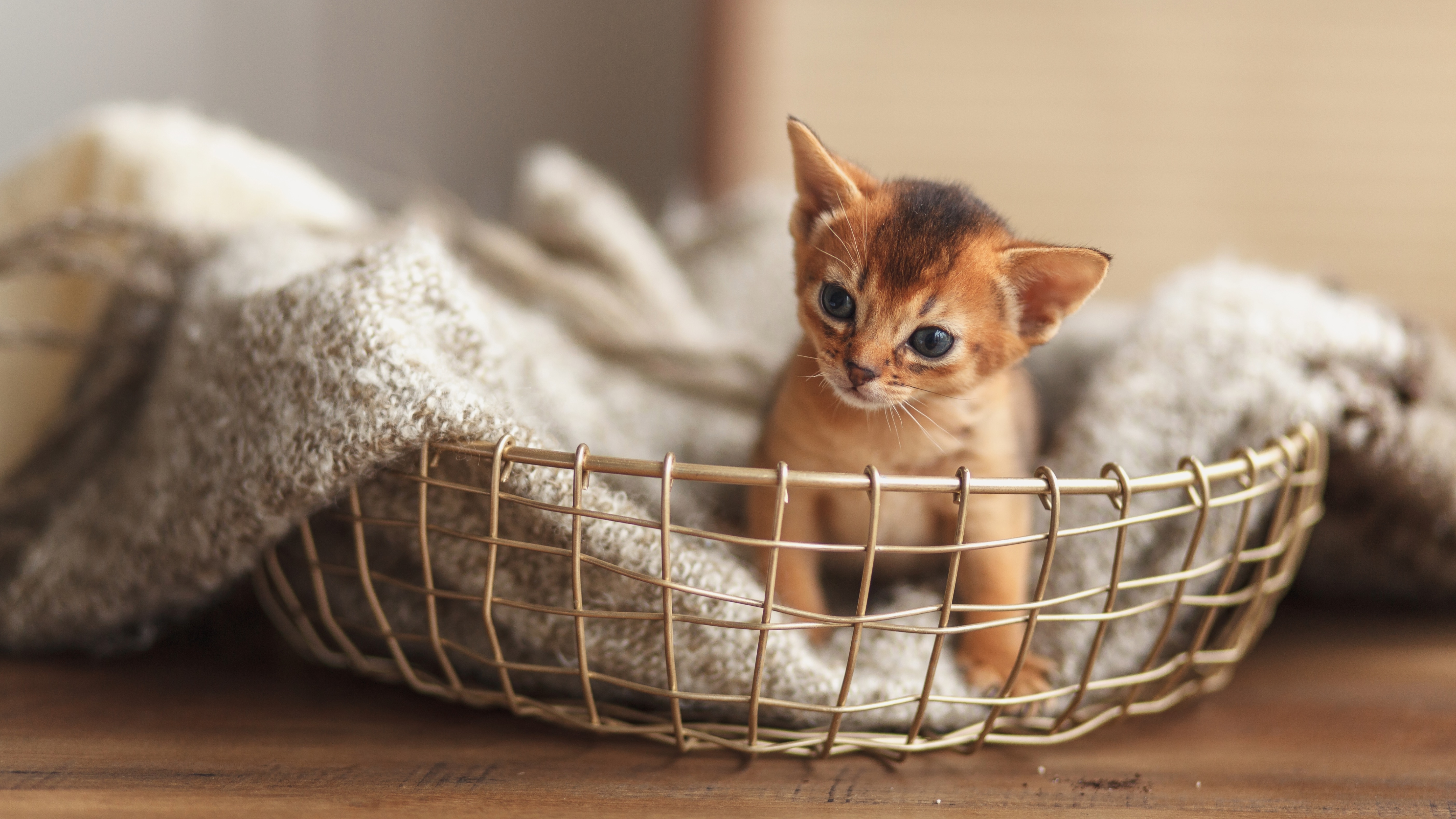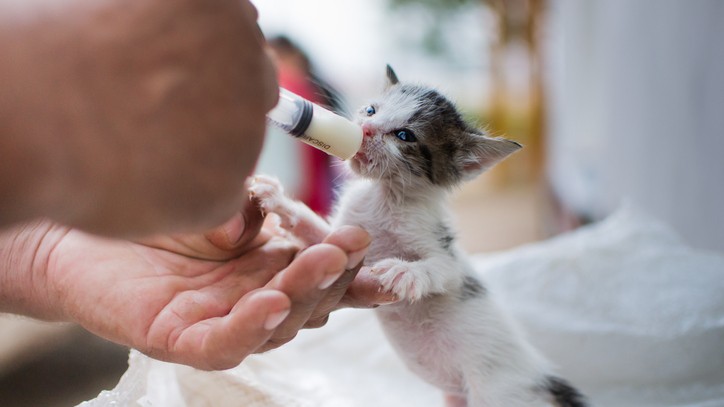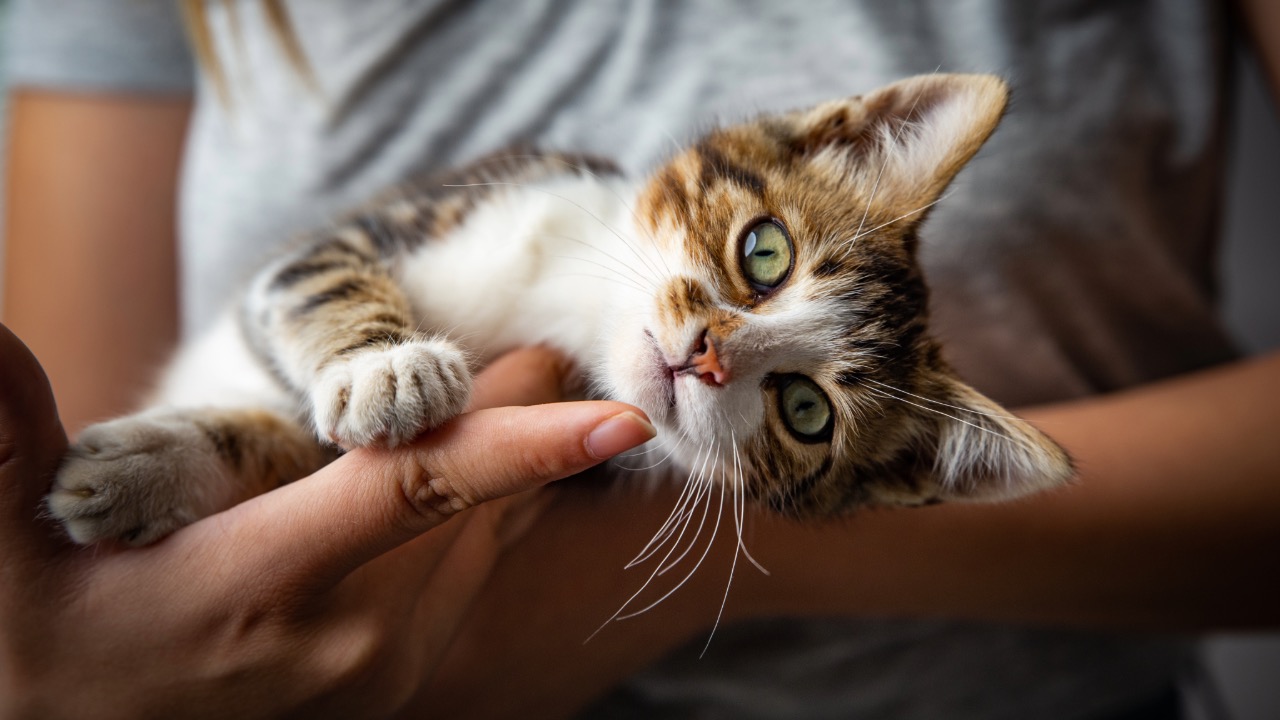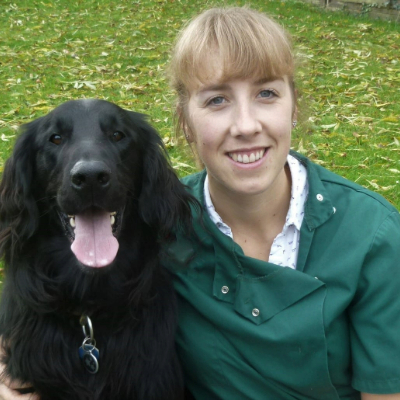We asked a vet how to care for newborn kittens, here’s what they said
Newborn kittens are just the cutest, but what happens if their mom isn’t around to care for them? Our vet explains exactly what to do…

Get the best advice, tips and top tech for your beloved Pets
You are now subscribed
Your newsletter sign-up was successful
While a mama cat will usually provide her newborn kittens with all the love, warmth, nutrition and affection that they need to thrive, it can be really helpful to know what to do if you find yourself in a situation where the mother isn’t around or isn’t able to care for her kittens.
If your new fur friend is under four weeks of age, you won’t need to worry about feeding them the best kitten food as they get all the nutrients they need from their mother’s milk. However, if this isn’t available to them, you’ll need to bottle feed them using kitten formula.
There will be other things to consider too, like keeping your kitten warm and helping them to poop. Plus, you’ll want to be aware of how to hold them correctly, what to do if you have a kitten not eating, and when it’s time to seek the assistance of a vet.
We understand how daunting all of this can feel, which is why we sought the advice of expert vet Dr. Elizabeth Racine. In this guide, she explains the best ways for keeping your kitty warm, how to clean them and dry them, what to feed them and how often, and how you can provide your newborn kittens with the mental stimulation they need to stay happy and healthy. Plus, Dr. Rebecca MacMillan answers some of your most commonly asked questions.
Keep them warm
One of the most vital aspects of caring for newborn kittens is keeping them warm. Kittens under four weeks of age do not have the ability to regulate their own body temperature and must rely on outside sources of heat, such as their mother’s body heat, to keep warm. Under normal conditions, the mother’s body heat would provide a warm environment of about 100-103 degrees Fahrenheit for the kittens. If the kittens are to survive, they must be kept in a warm environment and you must provide a heat source for them. The ideal ambient temperature for a kitten room is about 85 degrees Fahrenheit, with heat sources added to bring the temperature in the kittens’ enclosure to about 90 degrees Fahrenheit.
To provide a heat source for your kittens, consider purchasing microwavable heating discs such as Snuggle Safe heating pads. You can also use a traditional heating pad if necessary, just be careful with the wires. Whichever option you choose, be sure to wrap the heat source in a towel or blanket to ensure it does not burn the kittens. Feel the heat source in your hands before giving it to the kittens and make sure it does not feel too hot or too cold. Check your heat sources frequently and be sure to give your kittens an area of their enclosure where they can move away from the heat if they feel too hot.
Keep them clean and dry
In addition to keeping kittens warm, the mother also spends a significant amount of time keeping them clean. You will need to take on this role by cleaning the kittens after each meal. This is important not only for their health, but also for socialization and for the kittens to learn how to groom themselves as they get older. To clean the kittens, use a slightly damp, warm washcloth and gently rub them all over. Use short strokes similar to a mother cat grooming with her tongue. Make sure each kitten is clean and fully dry before returning it to the enclosure with its litter mates.
Get the best advice, tips and top tech for your beloved Pets
Kittens under 3 weeks of age will also need to be stimulated to urinate and defecate. To do this, simply use a cotton ball dipped in warm water and gently rub the kitten’s lower abdomen, rectum, and genitals. This should stimulate the kitten to urinate every time. Kittens should also defecate at least once a day with stimulation. Kittens under three weeks of age should be stimulated to urinate and defecate before and after every meal. At three weeks of age, kittens will begin to urinate and defecate on their own and will no longer need stimulation. At this point, you can place a small litter box with non-clumping litter in the kitten enclosure for the kittens to explore.
Keep them fed with proper nutrition

Never feed a kitten cow’s milk or goat’s milk – these do not have the right balance of nutrients for a growing kitten and may cause serious digestive upset. Instead, feed your kittens 1 part KMR powder to 2 parts water. The formula should be around 100 degrees Fahrenheit, which will feel warm to the touch but not hot. Formula that is too hot can burn the kittens and cause injury, while formula that is too cold can be unappetizing and can slow digestion. Always check the temperature of the formula prior to feeding your kittens.
Kittens need frequent feedings throughout the day in order to digest the formula properly. For kittens under two weeks of age, formula should be fed at least every 2 hours. Kittens 2-4 weeks of age can be fed every 3-4 hours. Any kitten that is weak, ill, or not eating as much as the others should be fed more frequently to ensure adequate intake.
To bottle feed a kitten, place the kitten on its belly on a blanket or towel. Hold the bottle at a 45 degree angle and gently place the nipple in the kitten’s mouth. It may take a few tries at first, but once the kitten understands that this is a source of milk, it should latch on and start suckling right away. Never place a kitten on its back to bottle feed, as this can cause the kitten to aspirate. This can potentially cause aspiration pneumonia, which can be fatal. Always keep the kittens upright and leaning forward, as they would be when nursing from their mother.
To ensure your kittens are eating well and getting enough calories each day, monitor their daily weight gain. This will tell you if you need to increase their daily feedings. Kittens should be weighed at the same time every day for accuracy. A healthy kitten will gain a half ounce per day or 4 ounces per week. If any of your kittens aren’t gaining enough, you may need to increase the frequency of their feedings. If they still aren’t putting on an appropriate amount of weight, it’s best to consult your veterinarian as there may be an underlying medical issue contributing to the problem.
Keep them mentally stimulated
Kittens are natural explorers and it’s extremely important for their development to have new experiences at a young age. Socializing your kittens should begin at 3 weeks of age. At this time, you can begin introducing the best kitten toys, different play surfaces, and new people. Handling the kittens frequently is also important to ensure they will be friendly and outgoing when it comes time to adopt them out. As they continue growing and learning about their environment, you can also begin to introduce household noises such as the TV and the vacuum cleaner, which will help them be more successful at settling into their new homes when they are adopted. If you choose to introduce other pets to the kittens, this should be done very gradually and under direct supervision at all times to reduce the risk of a fight.
How soon can you touch newborn kittens?

"It can be really tempting to touch and cuddle newborn kittens, but for the first two weeks of their life, you should avoid this as much as possible unless you are weighing them or there is an emergency," MacMillan advises.
"Mother cats are very focused on their kittens during this time, and if you handle them too much it could lead to issues with bonding or cause her to become aggressive towards you. After two weeks, however, it should be fine to touch them and at this point, it will help them with their socialization towards humans."
When should I worry about newborn kittens?
"Signs that a newborn kitten is not doing well include weakness, difficulty feeding, and being a lower weight/noticeably smaller size than its litter mates. Other issues that should cause concern include vomiting up their milk, crying more than usual, pale or blue-colored gums, and abandonment from their mother. If you have any concerns about a newborn kitten, then contact your vet for advice," says MacMillan.
What not to do with newborn kittens
"As well as not excessively handling newborn kittens, you should also make sure they are not separated from their mother at any point. They rely on her for warmth, food and to help with toileting and cleaning," explains MacMillan.
"If you do end up in a situation where you need to hand rear a kitten, then make sure you never give it goat or cow’s milk. You should always use a cat-specific milk replacement formula and ensure that the newborn receives a meal every 2 to 3 hours, both day and night.
Never hold the kitten on its back like a baby to feed. They feed on all four feet normally so you should try and replicate this position to avoid milk accidentally going into their airways. If you are unsure of how to hand-rear a kitten, speak to your vet for advice."
Raising newborn kittens is a lot of work and they can definitely be a handful. But the rewards are invaluable when you see your kittens grow and thrive. With these four major tips, you’ll be able to get started raising your kittens so they’ll have a bright future ahead of them!
For more guidance to help you give your new fur friend the best start in life, be sure to check out our top kitten care tips that will ensure you meet both their physical and mental health needs. Or, learn how to make DIY kitten toys.

Dr. Elizabeth Racine is a small animal general practice veterinarian with a bank of knowledge on all things pet health and wellness. She is especially interested in veterinary behavior, nutrition, and internal medicine. Dr. Racine also has experience writing content for the American Kennel Club, Merck Animal Health, Bayer PetBasics, Elanco, and CareCredit.

Dr. Rebecca MacMillan is a companion animal vet with over 13 years of experience treating and looking after pets. She graduated from the UK Royal Veterinary college in 2009, and has worked in several practices over the years. Rebecca is also an experienced writer, using her veterinary background to offer expert opinion and advice.
Dr. Elizabeth Racine is a small animal general practice vet covering all things pet health and wellness. Her special interests include veterinary behavior, nutrition, and internal medicine.
As a freelance writer, Dr. Racine has written content for major companies in the industry such as the American Kennel Club, Merck Animal Health, Bayer PetBasics, Elanco, and CareCredit. In her free time, Dr. Racine enjoys playing trampoline dodgeball, hiking with her beagle Dasher, and spending time with her three mischievous cats.
